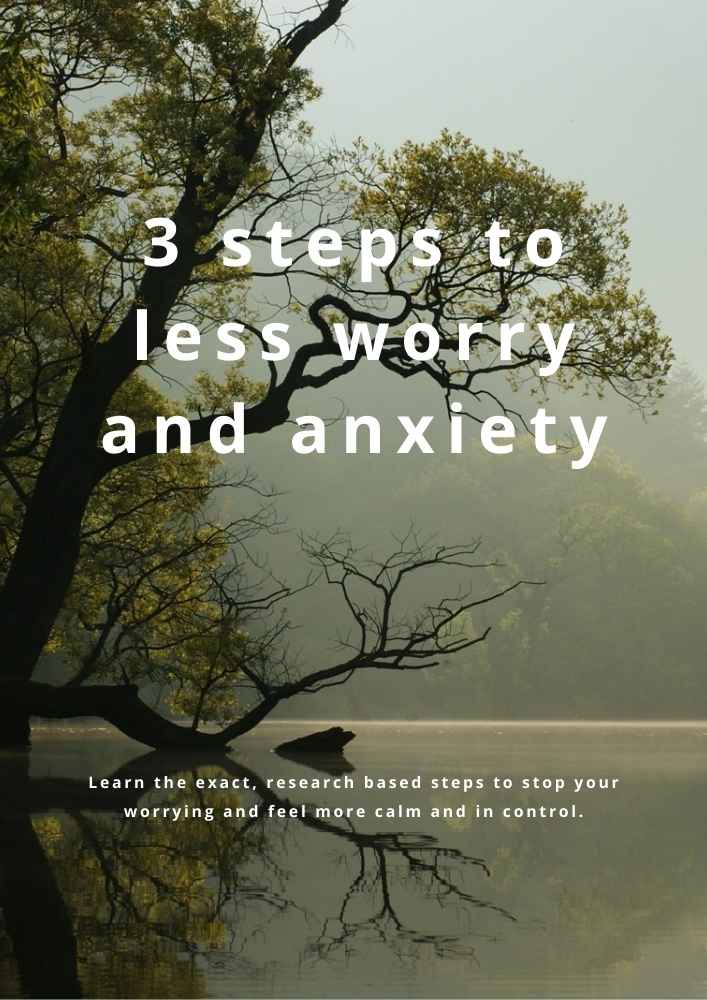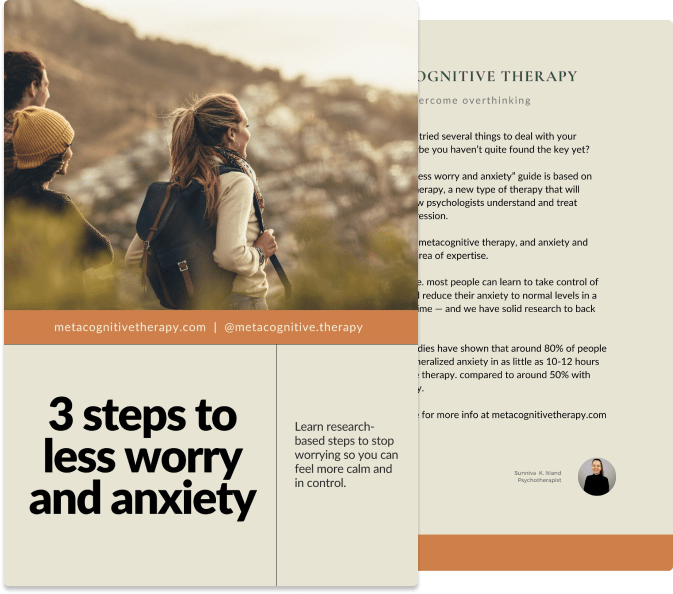Overcome social anxiety in the workplace, with Metacognitive Therapy

Download our best tips on reducing anxiety and worrying
Learn three powerful metacognitive therapy steps to stop the worry cycle, reduce anxiety, and feel calmer in everyday life.
.jpeg)
.jpeg)
If you’ve felt overly self-conscious or even ashamed at work, fixating on your shaking hands or stumbling on words, you know how overwhelming and paralyzing social anxiety can feel.
It might show up as a fear of speaking up in a group, or replaying every conversation, scrutinizing them for mistakes. People with social anxiety often dread meetings, presentations, and even casual conversations over lunch or at the coffee station.
But there’s hope for moving through this so social anxiety isn’t in the driver’s seat. Metacognitive Therapy (MCT) offers a groundbreaking, evidence-based approach by targeting the thinking patterns that fuel social anxiety, so you can regain confidence and reduce anxiety at work.
What’s at the root of social anxiety?
Many people with social anxiety feel trapped in a cycle of overthinking, fearing that they’ll be judged negatively — especially at their workplace. Common anxiety triggers are speaking up in meetings, presenting in front of others, or social situations and team bonding at work.
Before meetings, they may worry about sounding “dumb” or appearing nervous. In social interactions, they become hyper-aware of how they’re presenting themselves, monitoring their tone, facial expressions, and even eye contact. This cycle leads to avoidance behaviors, like staying silent during meetings or skipping lunch breaks. But these attempts to avoid judgment or social pressures only heighten the anxiety and isolation.
MCT strategies that work
Unlike traditional approaches that focus on reframing thoughts or boosting self-esteem, MCT addresses the beliefs and mental processes (known as the CAS) that directly fuel social anxiety. Most people with social anxiety believe their discomfort stems from poor social skills or low self-esteem. They try to compensate for this by over-preparing, over-analyzing,

Download our best tips on reducing anxiety and worrying
Learn three powerful metacognitive therapy steps to stop the worry cycle, reduce anxiety, and feel calmer in everyday life.
and ruminating — but these behaviours just paradoxically intensify their anxiety.
Through the following steps, MCT teaches people to change how they relate to their thoughts, rather than engaging with the content of the thoughts themselves.
1. Breaking the worry-rumination cycle
One of the first steps in MCT is questioning the benefit of worry and rumination in your life. Many people mistakenly believe that worrying and rumination helps them prepare for social situations.
Think about it: If worry and rumination help, why haven't they solved your anxiety yet?
Examining this insight with an MCT-certified therapist can reveal that ruminating is prolonging your social anxiety. You might feel a shift just by recognizing that rumination doesn’t prevent mistakes or reduce anxiety, so you can start to reduce the time you spend on unproductive worrying.
2. Reducing self-focused attention
Social anxiety can come with extreme self-monitoring. People become preoccupied with how they look, sound, and present themselves, fearing signs of anxiety like blushing, shaking, or a trembling voice. Understandably, this self-focused attention just amplifies anxiety.
MCT helps teach a strategy called Situational Attentional Refocusing (SAR): Instead of monitoring yourself, you shift your attention outward — for example, paying attention to others’ facial expressions, listening closely to what’s being said, or noticing specific details like what they’re wearing. This reduces self-consciousness, so you can experience more natural interactions without self-monitoring.
3. Letting go of safety strategies
People with social anxiety often use 'safety behaviors' to cope. These might look like sp
eaking quickly to get conversations or presentations over with, avoiding eye contact, or sitting near an exit during meetings. While these strategies might provide temporary relief, constantly relying on these strategies reinforces anxiety by signalling to your brain that social situations are dangerous.
An MCT therapist can help you experiment with dropping these safety behaviors (speaking more slowly, or maintaining eye contact in a supportive setting), so you can discover your ability to handle social situations without coping mechanisms.
Setting realistic goals for social anxiety
People with social anxiety often aspire to erase all signs and symptoms of their anxiety. But these goals can be unrealistic and out of their control, setting them up for failure and increasing self-focus.
MCT instead encourages setting positive, achievable goals, such as 'having an interesting conversation' or 'learning something new.' This fosters curiosity and openness, reduces the need for worry and rumination, and helps you shift out of self-monitoring.
The goal of MCT is not to eliminate anxiety entirely — fleeting anxious thoughts are a natural part of life, and feeling nervous before a big presentation is totally normal.
The takeaway
MCT focuses on reducing the impact of anxiety on your daily life. You can still perform well, even when you feel anxious, by shifting your focus outward to the conversations or tasks in front of you, and letting go of counterproductive coping strategies.
We hope this empowers you to engage fully in your workplace by letting go of fear and perfection, and embracing connection. If you're looking for support on your journey to improving social anxiety, you can book an appointment with one of our MCT-certified therapists today.



